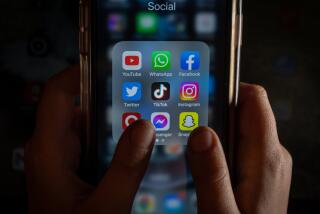The Cutting Edge: Computing / Technology / Innovation : When to Say When to Children Using PCs
- Share via
NEW YORK — The kids of the TV generation, now bringing up the personal computer generation, are grappling with new behavioral challenges just as their parents did.
And they’re learning that childhood use of a PC--like sugar, TV and garage chemistry sets--is best when it’s done in moderation.
Researchers have started looking at how families handle PCs as sales of the machines, use of on-line computer services and the sophistication gap between parents and children grow.
They’re finding that, like video games, PCs can sometimes be an annoyance to parents who believe the machines are taking up too much of their kids’ time.
They also warn that a PC can become a tool for illegal activity, if a child--usually a teen-ager--is unaware that accessing someone else’s computer is against the law.
Most parents and teachers set rules and time limits for using PCs. A few may find they must cope with kids who have to be wrestled from the machine.
“Anything that children do to excess is not healthy. A computer is no different,” said Sally Bowman Alden, executive director of the Computer Learning Foundation, a Palo Alto-based publisher of resources about computers for parents and teachers.
“It’s a matter of balance,” she said. “It’s no more healthy for a child to do nothing but read or do nothing but play soccer.”
There are no hard numbers that say how many kids become so hooked on computers that their behavior is viewed as unhealthy. And few suggest that a PC is more harmful to a child than it is to an adult who feels compelled to track every dollar in personal finance software or who obsesses about the planet’s eco-system in a SimEarth game.
“After a while, when they’ve had their fill of it, they get up and walk away from it,” said Judith Oser, a mother of two elementary school-age daughters in New York. “It holds their attention only so long.”
Many computer executives dismiss criticism about PC overuse by children, saying it’s better for a child to spend too much time with a PC, which stimulates interaction and thinking, than to spend too much time passively watching TV.
But with PC sales to the home growing faster than the overall market, such issues are getting more thought by psychologists and other researchers.
Carol Goldberg, a clinical psychologist who practices in the New York City area, said a parent should know whether a child is using the machine simply to play games or for more creative and educational purposes.
“Some of the computer games are rather addictive, just like the old pinball machines,” said Goldberg, who specializes in helping people get over a fear of technology.
“That’s quite different than the child who is spending a lot of time with a computer and doing constructive things,” she said. “One of the important things to look at is not just the length of time a child sits in front of the computer screen, but what the child is doing during that time.”






